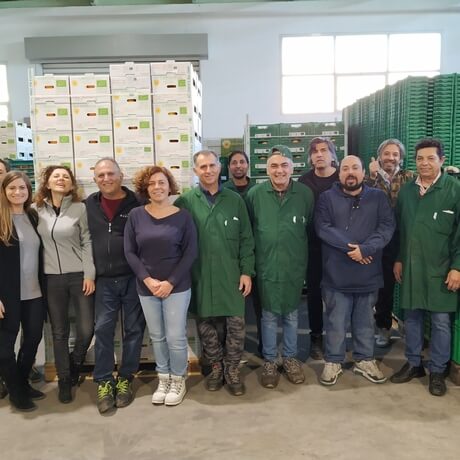Asking his son what he’d like to do when he was older was the moment that changed Warren’s life.
“I was talking to my son, who was nine years old at the time, and I asked him what he’d like to be when he grows up. And he told me, farming,” he says. At the time, Warren was working for a neighbouring fruit farm, like his father before him.
“Farming in South Africa is a white, male-dominated business. There are no emotions with that, it’s just how it is. When my son told me that, that’s when I realised. This boy of mine would like to go into farming. The best thing I can do is start my own business and give it to him. That was my biggest driver.”
Several years on, Warren farms his own 25 hectares of beautiful organic grapes, located about two hours’ drive from Cape Town. His grapes are mostly exported to the UK – including into our boxes.

Warren’s initial route into farming came about through the son of his father’s former employer. “He discovered that I’m very interested in farming. That was my passion during all these years, but I couldn’t study agriculture because of the apartheid system in South Africa,” he recalls. “Out of the blue he made me an offer and invited me to work with him. It was like music to my ears.”
Before long, he was running the family’s whole grape and blueberry growing business – but moving from employee to business owner still wasn’t an easy step. It was after that conversation with his own son that he finally plucked up the courage to approach a neighbouring landowner, who wasn’t using his own land and water access.
“We had a new government at that time who wanted to change the landscape, and they made available some funds for people like me,” he says. “I started with 13 hectares, and the funding was a grant, which was amazing as it really pushed me in the right direction. There are other non-white farmers, but in table grapes my situation is unique. I’m the only one who 100 per cent owns the business.
For Warren, a big incentive was the chance to work for himself. “I don’t want to ask people, I want to make the decisions. If I’m late for work, it’s my responsibility,” he explains.
Does he feel more respected now he runs his own farm? “It is exactly that,” he says. “I am treated with respect. In the past, other farmers would still question my ability to farm, even though I was making more money than them. When I started up on my own, suddenly they started treating me differently.
“The colour of my skin is still the same. I feel the same. I don’t know why you have to own a business for people to respect you.” Now Warren owns a farm that he can pass on to his teenage son, who still wants to study agriculture at college. “He loves spending time with me on the farm, hopefully that will continue. I also told him that if he doesn’t want to do farming that is fine with me, he should do something that he loves,” he says.




